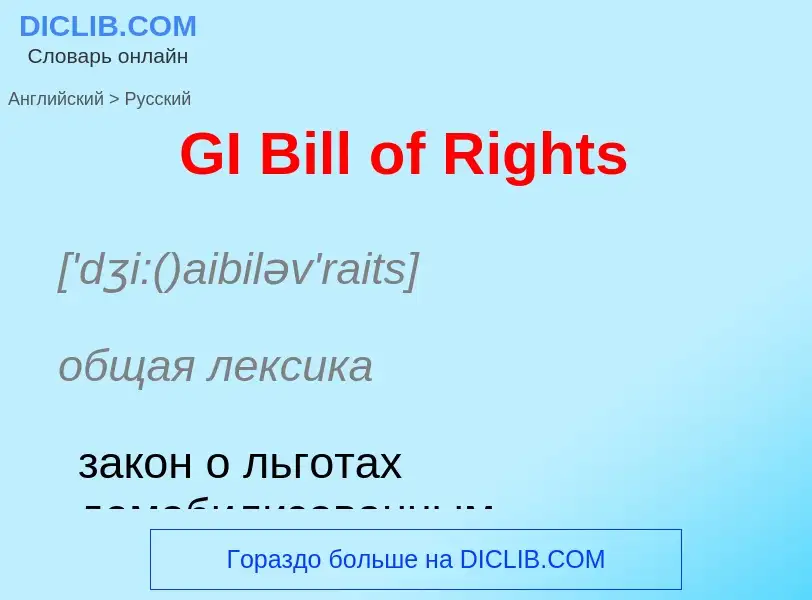Μετάφραση και ανάλυση λέξεων από την τεχνητή νοημοσύνη ChatGPT
Σε αυτήν τη σελίδα μπορείτε να λάβετε μια λεπτομερή ανάλυση μιας λέξης ή μιας φράσης, η οποία δημιουργήθηκε χρησιμοποιώντας το ChatGPT, την καλύτερη τεχνολογία τεχνητής νοημοσύνης μέχρι σήμερα:
- πώς χρησιμοποιείται η λέξη
- συχνότητα χρήσης
- χρησιμοποιείται πιο συχνά στον προφορικό ή γραπτό λόγο
- επιλογές μετάφρασης λέξεων
- παραδείγματα χρήσης (πολλές φράσεις με μετάφραση)
- ετυμολογία
GI Bill of Rights - translation to ρωσικά
['dʒi:()aibiləv'raits]
общая лексика
закон о льготах демобилизованным
[,bɪləv'raɪts]
общая лексика
Билль о правах (1689; был направлен против восстановления абсолютизма; юридически оформил итоги "Славной революции" [Glorious Revolution]; значительно ограничив власть короны [Crown] и гарантировав права парламента [Parliament], заложил основы английской конституционной монархии; наряду с др. актами составляет статутарную основу английской конституционной практики)
первые десять поправок в конституции США
история
билль о правах (в Великобритании)
первые десять поправок к конституции США
'Билль о правах' (в Англии)
синоним
Ορισμός
.
Βικιπαίδεια
The G.I. Bill, formally known as the Servicemen's Readjustment Act of 1944, was a law that provided a range of benefits for some of the returning World War II veterans (commonly referred to as G.I.s). The original G.I. Bill expired in 1956, but the term "G.I. Bill" is still used to refer to programs created to assist some of the U.S. military veterans.
It was largely designed and passed through Congress in 1944 in a bipartisan effort led by the American Legion who wanted to reward practically all wartime veterans. Since the First World War the Legion had been in the forefront of lobbying Congress for generous benefits for war veterans. Roosevelt, by contrast, wanted a much smaller program focused on poor people regardless of military service. As historians Glenn C. Altschuler and Stuart Blumin point out, FDR did not play a significant role in the contours of the bill. At first, Roosevelt shared with nearly everyone the idea that “satisfactory employment,” not educational opportunity, was the key feature of the bill. This changed in the fall of 1944, when Roosevelt's special representative to the European Theatre, Anna M. Rosenberg, returned with her report on the G.I.'s postwar expectations. From her hundreds of interviews with servicemen then fighting in France, it was clear they wanted educational opportunities previously unavailable to them. FDR "lit up," Rosenberg recalled, and subsequent additions to the bill included provisions for higher education.
The final bill provided immediate financial rewards for practically all World War II veterans, thereby avoiding the highly disputed postponed life insurance policy payout for World War I veterans that had caused political turmoil in the 1920s and 1930s. Benefits included low-cost mortgages, low-interest loans to start a business or farm, one year of unemployment compensation, and dedicated payments of tuition and living expenses to attend high school, college, or vocational school. These benefits were available to all veterans who had been on active duty during the war years for at least 90 days and had not been dishonorably discharged.
By 1956, 7.8 million veterans had used the G.I. Bill education benefits, some 2.2 million to attend colleges or universities and an additional 5.6 million for some kind of training program. Historians and economists judge the G.I. Bill a major political and economic success—especially in contrast to the treatments of World War I veterans—and a major contribution to U.S. stock of human capital that encouraged long-term economic growth. It has been criticized for various reasons including increasing racial wealth disparities during the era of Jim Crow.
The original G.I. Bill ended in 1956. The Post-9/11 Veterans Educational Assistance Act of 2008 provided veterans with funding for the full cost of any public college in their state. The G.I. Bill was also modified through the passage of the Forever GI Bill in 2017.


![President Roosevelt]] signs the G.I. Bill into law on June 22, 1944 President Roosevelt]] signs the G.I. Bill into law on June 22, 1944](https://commons.wikimedia.org/wiki/Special:FilePath/GI Bill signing.jpg?width=200)


![Draft of the [[United States Bill of Rights]], also from 1789 Draft of the [[United States Bill of Rights]], also from 1789](https://commons.wikimedia.org/wiki/Special:FilePath/Bill of Rights Pg1of1 AC.jpg?width=200)
![The [[Bill of Rights 1689]] is an Act of the [[Parliament of England]] asserting certain rights The [[Bill of Rights 1689]] is an Act of the [[Parliament of England]] asserting certain rights](https://commons.wikimedia.org/wiki/Special:FilePath/English Bill of Rights of 1689.jpg?width=200)
